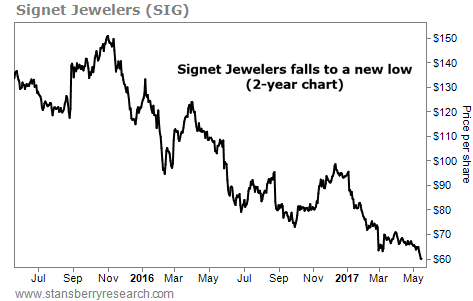| Home | About Us | Resources | Archive | Free Reports | Market Window |
Think Like a Business Owner, Not Like a TraderBy
Wednesday, May 17, 2017
If you're like most investors, you probably worry too much about short-term share-price movements.
To make several times your money in the stock market, you must learn to find great businesses... buy them at cheap prices... and above all, hold on to them long enough.
Multibaggers take time. If you can't be patient, you can't get rich in stocks. Period. No ifs, ands, or buts about it...
The good news is that these days, it's easier than ever to be patient.
Andrew Pastor, a portfolio manager at asset-management firm EdgePoint Wealth Management, pointed this out in January. He says the average holding period for NYSE-listed stocks since the 1960s has been shrinking. From his essay...
The lesson is simple: Holding stocks for as little as two to three years qualifies as a competitive advantage for investors these days. (Pastor uses the term "proprietary insight," the edge you give yourself when you behave differently from the crowd for intelligent reasons.) As he puts it...
Our strategy is designed to exploit this competitive advantage. The average holding period for all Extreme Value recommendations since inception in 2002 is about 1,150 days, or a little more than three years. So some of the best benefits you'll get from our strategy aren't even included in our published results: better tax treatment and far lower trading costs. Commissions and fees, interest rates, and other "frictional" costs of overactive trading will eat away at your profits over time.
Don't be a trader in the stock market. Be a business owner.
If you own a pizza parlor, you don't wake up every day thinking about selling it so you can buy a shoe store. You think about how to make better pizza, how to sell more pizza, or how to do something for your customers that competing pizza parlors aren't doing. You plan to hold that business for the long term.
Equity is long-term capital, the longest-term capital, with no expiration or maturity date. If you're going to succeed as an equity investor, you must think long term. Obsessively watching share-price movements conditions you to think short term. You should be spending that time studying the businesses you own.
The lesson here is that a stock isn't a lottery ticket with a price graph attached. It's a proportional share in the fortunes (good or bad) of a real business.
That's how I approach every buy, hold, and sell recommendation I make. You'll do yourself a huge favor by doing the same.
Good investing,
Dan Ferris
Further Reading:
"You won't have to pick stocks anymore. They'll pick you!" Dan writes. One resource you may not have considered can help you identify stand-out companies... great businesses you want to own for the long haul. Read more here: Three Clues for Finding Companies That Jump off the Page.
Instead of betting on specific outcomes, Dan says you should hold world-class assets for the long term – investments that can survive whatever happens in the markets. Preparing your portfolio for a wide range of outcomes isn't easy... But these simple tips are a great way to get started. Read more here: Five Ways to Prepare for Any Market Environment.
Market NotesNO BOTTOM IN SIGHT FOR RETAILERS Today's chart highlights the continued decline of American retailers...
Over the past few months, we have highlighted many cases of weakness in the retail business. To put it plainly, not many companies were prepared for the seismic shift to online shopping. Companies like Michael Kors (KORS), L Brands (LB), and VF Corporation (VFC) are faring worse than others. But they are not alone...
For proof, we'll look to the largest specialty jewelry retailer in the U.S., U.K., and Canada: Signet Jewelers (SIG). The company owns about 3,600 stores under its brands – which include Kay Jewelers, Zales, and Jared the Galleria of Jewelry. That's a big brick-and-mortar presence... To no surprise, Signet reported its sales fell for the third consecutive quarter during its last earnings report.
As you can see in the chart below, Signet has suffered a downward slide over the past two years. Shares just struck a new four-year low yesterday... And they are now down more than 60% from their October 2015 highs. Looks like no one "went to Jared" lately...
 |
Recent Articles
|



